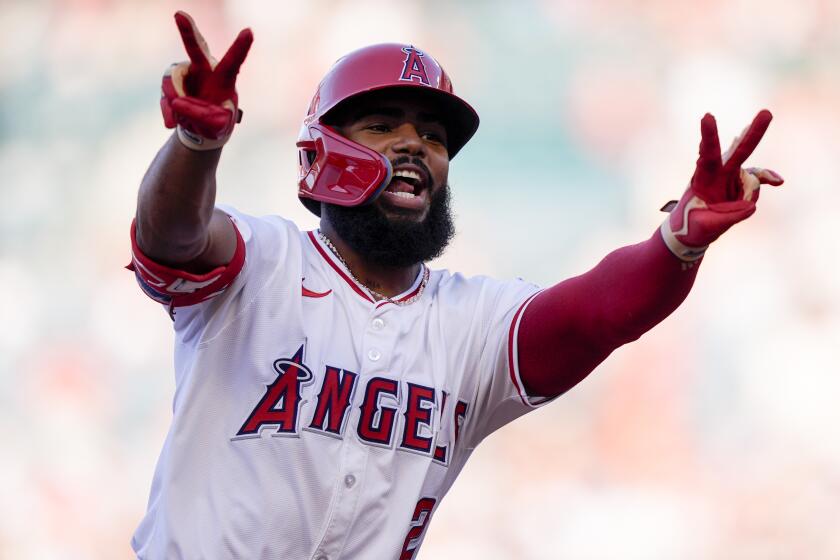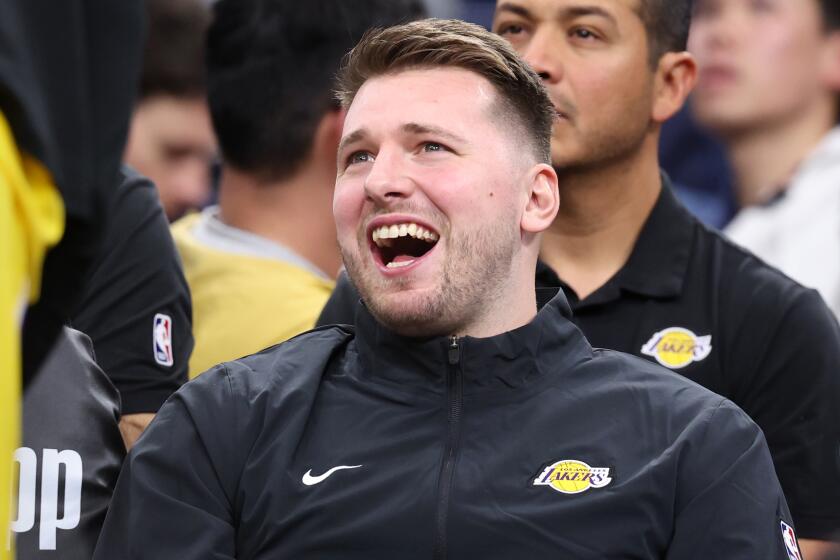Los Angeles Times Special Report / Baseball : Bittersweet Blues : Cancellation of ’94 World Series Stirs Memories of Link Between Dodger Success and A Family’s Tragedy
- Share via
In my family there is a peculiar and intractable connection between death and the World Series. The sad demise of the 1994 fall classic has brought back to me the painful events that played out in my life.
In 1958, the year the Dodgers moved from Brooklyn, my family also moved to California. I was 5. Southern California was different then, like a beautiful uncongested kingdom with an ocean view and a forgiving climate. The game of baseball fit effortlessly into that territory with no seasons, a place where the game could go on and on. When baseball moved west it forged a perfect union: Los Angeles and the Dodgers. We felt a part of that union and easily, unashamedly fell for, maybe even worshiped, the graceful and perfect presence of Sandy Koufax.
In 1963 the Dodgers won the pennant and play the hated Yankees in the World series. My father had tickets and was going to his first World Series game. Being born and raised in Chicago had severely limited his World Series opportunities. On an unforgettable Saturday before the Series began, his father died, suddenly. I had just turned 11 and was the only one home that afternoon when the phone call came. I had no experience with death, until Western Union called. They asked for my father. I told them he was not home and I offered to take a message. The operator matter-of-factly read me the telegram from my aunt in Chicago saying that my grandfather had died of a heart attack. That was it.
I walked into the bathroom and when I looked at myself in the mirror, sobs came from everywhere in my body. I tried and couldn’t wipe away the tears that would not stop. Knowing I had to give this horrible news to my father was unthinkable. I felt paralyzed. It wold be hours before anyone returned home. Helpless and frightened I wandered around that house for what seemed like days, crying and agonizing over how to deliver the message.
I wrote the message down and left it on the dining room table. I backed away and stared at the note. A small, white piece of paper lying on a flower-print table cloth. It stuck out like obscene graffiti or fetid garbage fouling the entire room. I went to hide in the back of the house.
When I heard our car in the driveway and the ordinary sound of the garage door being raised, a sound I’d heard a thousand times, I began shaking. I stood trembling in the hall until I knew they’d reached the table where I’d left my ugly missive. I moved slowly toward the dining room, anxiety crawling all over me. I saw my father reading the message and watched him slowly raise his head, a pale, questioning look on his face. I stood immobilized with my cheek flattened against the wall, my hands clutching onto the door frame, wishing I could think of something to say.
It was the first time I saw my father cry and it pained me more than anything I can remember from my childhood.
My father gave away his World Series tickets and he and my mother went to Chicago for the funeral.
In 1965, the Dodgers played the Minnesota Twins in the Wrold Series and again my dad had tickets. Exactly two years to the day of her husband’s death, my grandmother died. My father this time received the news personally from his sister. Again he had to give away the World Series tickets and again he flew with my mom to Chicago for the funeral.
For years my father joked with some sadness that he wouldn’t accept World Series tickets because he was afraid somebody would die.
My family’s interest in baseball waned over the years, but the Dodger World Series victory a remarkable year, staying in first place nearly the whole season. With some close friends I in 1981 and a relationship with a baseball-addict, rekindled my fever. In 1988 the Dodgers had sat through more than 50 games that summer, many of them come-from-behind victories. It was a cancer.
For a short while, everybody, even his surgeon, was fooled into thinking he would be OK. season of baseball triumph and exhilaration. In the middle of it, my father was diagnosed with But when he relapsed, they could not help him. My watching got a achingly difficult and ultimately we were resigned to the inevitable. We knew what was left for him and we couldn’t stop it, couldn’t change it.
The day my father died, the Dodgers clinched the division. Through the final games of the season, I had an eerie, unexplainable feeling that they’d win it all. Driving home on the night of my father’s funeral I was listening to Game 4 of the Dodger-New York Met National League championship series and heard catcher Mike Scioscia hit a rare two-run homer against Dwight Gooden. It was the ninth inning at Shea Stadium and the game was tied, 4-4. When I got home, I threw myself on the floor directly in front of the TV, my hands touching the screen, using the television as a conduit, feeling the electricity of the game course through me. Kirk Gibson hit an extra-inning home run, and the unmistakable feeling came over me again: They would win it. Even though he had started the day before, Orel Hershiser came in to pitch with two out in the 12th. Like a piece of video on fast-forward, he threw quickfire fastballs and sharp-breaking curves, down and away, retiring Kevin McReynolds on a fly ball to center field, saving the game in freezing New York. The series was coming back to L.A. I felt an uncomfortable guilt seeping through me as that game ended, thinking about my dad.
In Game 7 the Dodger humiliated the Mets early and won despite my guilt. Being there to see the Dodgers win the pennant was the antithesis of being there to see my father lose his battle.
Piled on top of all that elation and sorrow was the most remarkable baseball experience of my life. I imagine anyone who was there that night feels the same. The Dodgers were down to their last strike in Game One of the World Series when a mangled Kirk Gibson made his only appearance of the entire series and hit the home run that will be chronicled alongside Carlton Fisk’s, Bobby Thomson’s and Bill Mazeroski’s. When the ball sailed high over the stunned Jose Canseco, standing far out in right field looking straight up, me and everybody in the ball park that night seemed to be anointed with fortune. Gibson rounded the bases and surrendered to us a rare and brilliant baseball treasure. A friend and I went to my house and opened a $100 bottle of champagne that wasn’t even chilled. We didn’t care.
Living with that potent, exhilarating sports emotion and balancing it against the painful, draining summer of my father’s illness was almost perverse for me. But it seems now like a blessing, to have been given such an uplifting event to help salve the ache of the bitter months. Having been able to share that victory however with my father, would have made it much sweeter. But even though I would have given anything, most easily the World Series victory, to have my father full and healthy, I think he could not have gone in a more fitting, symmetrical season. That year the Dodgers surrounded us with unspoiled, classic, brilliant baseball. It also reminded me of the unkind and bizarre connection between my family and the Dodgers in the World Series. Before the 1994 season was ceremoniously bickered to death, the Dodgers were in the first place.
But even if they’d made it to the World Series, that sad old joke is now mine and I’d have to wonder about accepting tickets. Somebody might die.
More to Read
Go beyond the scoreboard
Get the latest on L.A.'s teams in the daily Sports Report newsletter.
You may occasionally receive promotional content from the Los Angeles Times.










